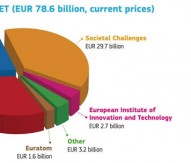
LERU universities want an ‘ERA of change’ after EU elections
The League of European Research Universities (LERU) has urged EU political leaders to set ambitious and concrete goals for the next legislature.
They want the EU to use smart investment in research and innovation as a winning investment for Europe’s future, help Europe power up economically, and build a better society for its citizens. To succeed, they said new mechanisms, incentives, and rewards are needed to harness the strengths of the EU’s R&I policies and programmes and forge smarter links with those of the member states.
In a statement, LERU called for “a real progression on Europe’s long standing goal to achieve a European Research Area (ERA)”. To achieve measurable progress, they said, the ERA needs an improved partnership between the EU, its member states, and research performers, including universities.
Kurt Deketelaere, secretary-general of LERU, commented: “The Commission should seriously consider introducing specific legislative measures in those few cases where the internal market for research and innovation is distorted and where real progress cannot be achieved by voluntary initiatives by member states alone.”
LERU said it wants to see more consistency and transparency in EU policies, including a better division of labour among the Commission directorates dealing with R&I, better co-ordination with other EU institutions, and more power for the Chief Scientific Advisor.
LERU supports the ERA process but thinks a number of issues need to be targeted in the next legislature. High on the list are better alignment of policies on a global level, better linkages between the EU’s R&I and higher education policies, and a better inclusion of the humanities and social sciences.
Promoting research integrity, fostering better interactions with society and devising policies that can deal with the rapidly changing nature of science should also be top priorities according to LERU.
Alain Beretz, president of the Université de Strasbourg, said: “If our universities are to continue to deliver groundbreaking knowledge, smart graduates and innovative products, they need supportive policies that will enable them to successfully compete on the world stage.”





